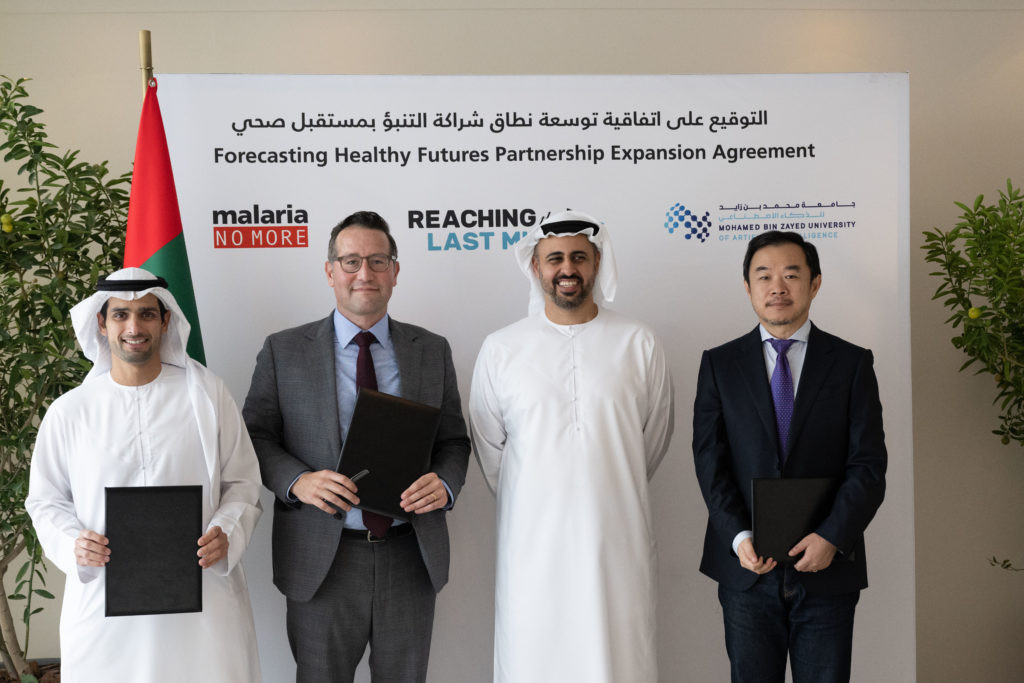Abu Dhabi, January 3, 2023 – Malaria No More (MNM) today announced the expansion of its climate and health initiative, Forecasting Healthy Futures, through a new 3-year, $5 million award from the Reaching the Last Mile initiative (RLM), as witnessed by His Highness Sheikh Theyab bin Mohammed bin Zayed, Member of the Executive Council.
Forecasting Healthy Futures (FHF) is a consortium of leading health and technology organizations working to prevent the effects of climate change from hindering progress toward disease elimination. Launched in 2020 through seed funding provided by Reaching the Last Mile Initiative, FHF is at the forefront of these climate-informed malaria elimination efforts. By developing sophisticated prediction and planning tools, as well as designing supportive policies to help governments implement them, health interventions are timed and targeted more effectively.
The expanded partnership was signed by Nassar Al Mubarak representing Reaching the Last Mile; Martin Edlund, CEO of Malaria No More and Professor Dr. Eric Xing, President of Mohamed bin Zayed University of Artificial Intelligence (MBZUAI).
His Highness Sheikh Theyab bin Mohamed bin Zayed, Member of the Executive Council, commented: “We are proud to be offering our renewed commitment to Forecasting Healthy Futures, and hope that this marks another milestone in the UAE’s long-standing fight against preventable diseases, which started decades ago with our Founding Father, the late Sheikh Zayed bin Sultan Al Nahyan.”
“Today, under the guidance of His Highness Sheikh Mohamed bin Zayed Al Nahyan, President of the UAE, we continue to work hand-in-hand with key players in the field of global health, through meaningful partnerships that create real impact whilst upholding our values of helping those in need and empowering people to live healthier and more dignified lives. We celebrate with great optimism the new heights and potential to reach together. Thanks to the tireless efforts of the FHF team and its partners, supported by our world-class university partners at MBZUAI, we look forward to eradicating this disease and moving closer to a malaria-free world.”
Malaria, one of the world’s oldest and deadliest diseases, devastates families and perpetuates the cycle of poverty in many communities and countries. According to the recently launched World Health Organisation’s (WHO) World Malaria Report 2021, malaria caused an estimated 247 million cases and over 619,000 deaths. Three out of four deaths were children under five years old. At a time when climate action is at the top of government agendas across the globe, the impact of climate change on eliminating malaria and other climate-sensitive infectious diseases, is an issue that cannot be ignored. Rising temperatures, changing rainfall patterns and extreme weather disrupt health systems and alter the range and seasonality of vector borne diseases.
One mosquito species in particular – Anopheles stephensi – has expanded its range into urban areas and shows increasing insecticide resistance. As per the WHO report, a new initiative launched in September 2022 aimed at stopping the further spread of A. stephensi by increasing surveillance, improving information exchange and prioritizing research.
Progress towards malaria elimination is increasing. The World Malaria report highlighted that in 2021, 35 endemic countries recorded fewer than 1000 new malaria cases, and five of the highest burden countries recorded a decline in deaths. These successes demonstrate the right tools and funding can save lives.
The latest US$5 million commitment from RLM builds on an introductory award of US$1.5 million made in 2020 to assess the feasibility of climate-informed malaria strategies. The initiative also receives support from IBM’s The Weather Company, the Tableau Foundation, and other members.
In January 2022, Forecasting Healthy Futures launched the new Institute for Health Modeling and Climate Solutions, a global institute with the mission to combat malaria in the face of climate change and weather volatility.
Phase 2 of the Forecasting Healthy Futures initiative includes the following primary objectives:
- Increase Awareness and Action at the Intersection of Climate Change and Global Health: Educate policy makers, thought leaders and donors on the growing impact of climate change on human health, promoting investment in proactive technology-enabled solutions and the supportive policy reform needed to build resilient health systems.
- Improve the Effectiveness of Disease Early Warning Systems: Expand a network of experts driving the development of sophisticated early warning systems and demonstrate the potential of artificial intelligence and new data sources in creating increasingly accurate forecast and response systems for malaria and other climate-sensitive infectious disease.
- Support the Implementation of Prediction and Planning Solutions: Provide technical support to health systems to tailor emerging solutions to meet their local needs, integrate with existing systems and data sources, adopt policies and practices needed to sustain them, and validate the impact on disease elimination efforts and cost-effectiveness.
"Following Egypt, the world now turns its attention and hopes for addressing climate change to the United Arab Emirates and COP28 this year. Given the UAE’s longstanding leadership on disease elimination, it is the ideal place to spotlight the complicating effects of changing climate conditions on diseases like malaria, dengue, zika, and other climate-sensitive disease,” said Martin Edlund, CEO of Malaria No More. “With renewed commitment from foundational partners like Reaching the Last Mile, Forecasting Healthy Futures hopes to show a path forward for innovative global health solutions that can protect the health of most vulnerable people and communities in the context of climate change,”
Beginning in December 2022, the Institute for Health Modeling and Climate Solutions will launch operations in Indonesia, alongside the Mohamed bin Zayed University of Artificial Intelligence and Indonesian stakeholders from the public sector and academia.
“AI is becoming a powerful tool for researchers and decision makers to glean crucial insight from massive amounts of data, such as the data we have on malarial pathology and transmission along with its environmental and climate contexts, to develop strategies towards disease eradication,” said Professor Eric Xing, President of MBZUAI. “Through machine learning, we can analyze tremendous amounts of satellite and atmospheric data in real time to predict trends and guide the teams on the ground to forecast or identify risks and take action. As the world’s first graduate AI research university, we are honored to support Malaria No More and The Last Mile Foundation in their efforts to free humanity from malaria once and for all.”
###
About Malaria No More
Malaria no More envisions a world where no one dies from a mosquito bite. More than a decade into our mission, our work has contributed to historic progress toward this goal. Now, we’re mobilizing the political commitment, funding, and innovation required to achieve what would be one of the greatest humanitarian accomplishments – ending malaria within our generation. For more information, visit www.malarianomore.org
About Forecasting Health Futures
Forecasting Healthy Futures is a growing coalition of global health, technology, and public sector partners coming together to bring greater attention to the inequities at the intersection of global health and climate change, and to promote proactive solutions that use integrated data and artificial intelligence to anticipate and mitigate the worst health effects of a warming planet. Forecasting Health Futures’ partners include Reaching the Last Mile, Mohamed Bin Zayed University of Artificial Intelligence, the Global Institute for Disease Elimination, PATH, the Tableau Foundation, IBM’s Weather Company, and the Institute for Health Metrics and Evaluation (IHME).
About Reaching the Last Mile
Reaching the Last Mile (RLM) is a portfolio of global health programs working towards disease elimination that is driven by the personal commitment of His Highness Sheikh Mohamed bin Zayed, President of the United Arab Emirates. The Initiative provides treatment and preventative care in communities that lack access to quality health services, with a specific focus on reaching the last mile of disease elimination. RLM’s mission represents His Highness’s dedication to ending preventable diseases that affect the world’s poorest and most vulnerable communities and helping millions of children and adults live healthy, dignified lives. For more information, visit: https://www.ReachingTheLastMile.com
About Mohamed Bin Zayed University of Artificial Intelligence
MBZUAI drives excellence in knowledge creation, transfer and the use of AI to foster economic growth, while positioning Abu Dhabi as a hub for the international AI community. The university establishes and continually evolves interdisciplinary, collaborative research and development capability in the field of AI, while educating students to be innovators and leaders with the breadth and depth of knowledge to grow technology and enterprise in the UAE and globally. For more information,
visit: https://mbzuai.ac.ae

